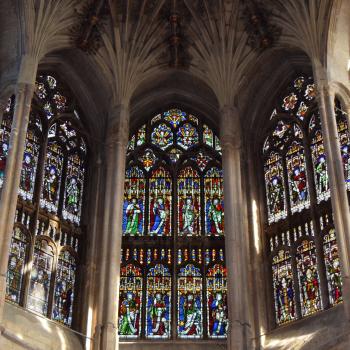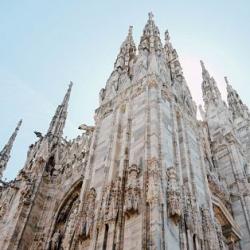This poem by Christina Georgina Rossetti (1830-1894) is my favorite poem I’ve read in a long while.
Raised in London, Rossetti was the daughter of exceptional parents. Her father, Gabriele Rossetti was an Italian poet, Dante scholar, and professor at Kings College. Frances, her very sharp mother, devoted herself to her children’s intellectual formation, steeping their imaginations with the words of the Bible, Bunyan’s Pilgrim’s Progress, and Augustine’s Confessions. She was a Victorian poet whose poetry reflects her deep and abiding Anglo-Catholic faith. This poem seems to capture all of these influences: it’s saturated in biblical imagery and alludes to both Dante (lines 24-28 refer to a character called Love in La Vita Nuova) and Bunyan (lines 19-22 refer to Christian’s escape from the prison of the Giant Despair in The Pilgrim’s Progress) in the second stanza.
Though it nowhere appears in the text of the poem, the substance of “they desire a better country” fills the poem throughout. The title makes clear that the poem was inspired, at least in large part, by Hebrews 11, especially vv 13-16. There are other clear allusions to the call of Jesus as described in the Gospels and the New Jerusalem as described in Revelation. As is obvious, Stanza 1 is about the past; Stanza 2 is about the present stage of the Christian pilgrimage, full of hope and fear; Stanza 3 is a vision of the future hope which enables us to live faithfully in the present.
Read it. Several times. Hope you can feel it.
I
I would not if I could undo my past,
Tho’ for its sake my future is a blank;
My past, for which I have myself to thank,
For all its faults and follies first and last.
I would not cast anew the lot once cast, 5
Or launch a second ship for one that sank,
Or drug with sweets the bitterness I drank,
Or break by feasting my perpetual fast.
I would not if I could: for much more dear
Is one remembrance than a hundred joys, 10
More than a thousand hopes in jubilee;
Dearer the music of one tearful voice
That unforgotten calls and calls to me,
‘Follow me here, rise up, and follow here.’
II
What seekest thou far in the unknown land? 15
In hope I follow joy gone on before,
In hope and fear persistent more and more,
As the dry desert lengthens out its sand.
Whilst day and night I carry in my hand
The golden key to ope the golden door 20
Of golden home; yet mine eye weepeth sore
For the long journey that must make no stand.
And who is this that veiled doth walk with thee?
Lo, this is Love that walketh at my right;
One exile holds us both, and we are bound 25
To selfsame home-joys in the land of light.
Weeping thou walkest with him; weepeth he?—
Some sobbing weep, some weep and make no sound.
III
A dimness of a glory glimmers here
Thro’ veils and distance from the space remote, 30
A faintest far vibration of a note
Reaches to us and seems to bring us near,
Causing our face to glow with braver cheer,
Making the serried mist to stand afloat,
Subduing langour with an antidote, 35
And strengthening love almost to cast out fear,
Till for one moment golden city walls
Rise looming on us, golden walls of home,
Light of our eyes until the darkness falls;
Then thro’ the outer darkness burdensome 40
I hear again the tender voice that calls,
‘Follow me hither, follow, rise, and come.’











